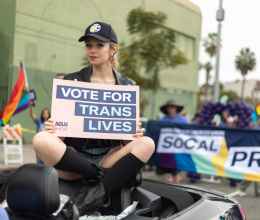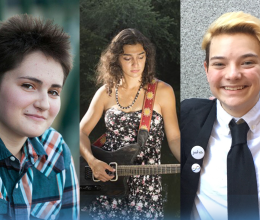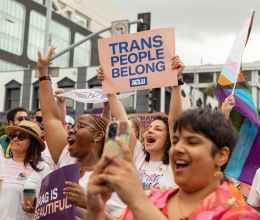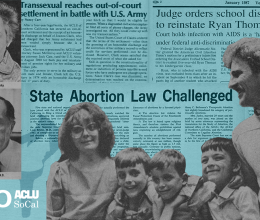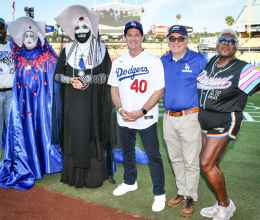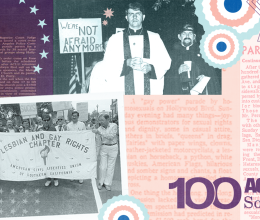
LOS ANGELES - A task force that was convened to counter the devastating effects of homophobia in the foster care system in Los Angeles County gathered at the Edelman's Children's Court today to unveil a "hate-free zone poster," which was placed in the Children's Court lobby - as well as to set forth its recommendations on how to address the issue of homophobia in the foster care system.
"The lesbian, gay, bisexual, and transgender (LGBT) community is committed to the safety and welfare of LGBT youth," said Martha Matthews, the David Bohnett Attorney at the ACLU of Southern California. "We must fight discrimination, harassment, psychological abuse, and physical assault of youth wherever we uncover it - and youth in foster care are especially vulnerable to abuse based on their actual or perceived sexual orientation, their gender identity, or their nonconformity to gender expectations."
"Some LGBT youth entered the foster care system precisely because of conflicts centering on their gender identity, gender nonconformity, or actual or perceived sexual orientation," said Matthews. "But rather than finding a haven from a home that can't accept their difference, they find instead a system that exposes them to the same risks all over again."
Gay, lesbian, bisexual, and transgender youth nationwide have long encountered harassment, violence, attempts to coerce them into heterosexuality, and other forms of abuse. A lawsuit filed in New York City in 1999 charged that LGBT youth in foster care were routinely targeted with physical and psychological abuse.
The task force has found that Los Angeles-area LGBT youth in foster care face serious challenges as well, and it has begun to document cases of abuse and discrimination. Task force members have collected incidents they've uncovered ranging from adults in a foster home failing to protect a youth from peer harassment, to a Baptist foster family attempting to coerce a youth to become heterosexual, to court staff harassing a male-to-female transgender youth.
33,364 youth are in foster care in Los Angeles County, and reports have shown over the years that the system has failed youth in numerous ways. Task force members believe that homophobia and the resulting physical and psychological abuse of LGBT youth are a troubling and overlooked part of the foster care crisis.
"We know from youths' accounts that, in addition to all of the other problems youth face in the foster care system, LGBT youth face discrimination and harassment based on who they are," said Matthews.
Linda Velasquez, 19 years old, told of her experience in the foster care system, including her experience at a Catholic-run foster group home.
"Coming out as a lesbian in your teens isn't easy no matter where you are, but in my group home, I was treated differently from other residents," said Velasquez. "My actions were monitored more closely. I was told not to talk about my personal life. I wasn't allowed to spend time alone with staff members. I was told that I was confused, and I frequently heard anti-lesbian slurs, which staff members did not attempt to stop. It's almost as if they stopped helping me as soon as they found out I was gay, because they wanted me to leave."
Presiding Judge Terry Friedman will hang a framed copy of the poster in the court house lobby.
"This poster is first step toward raising awareness on these issues," said Matthews, "but much more is needed."
The task force recommended:
' Fully implementing and enforcing the Los Angeles County Department of Children and Family Services' (DCFS) nondiscrimination policy, through: including questions about sexual orientation and gender identity in DCFS's guidelines for needs assessments and placement decisions; enforcing "zero tolerance" of homophobic bias or discriminatory treatment of LGBTQ youth by DCFS employees; acting promptly to investigate and resolve incidents of harassment, violence, or other mistreatment of LGBTQ youth in placements; and requiring all foster and group homes to take responsibility for preventing homophobic harassment, threats or violence by other youth.
' Training for all youths' social workers on: DCFS's non-discrimination policy; how to discuss issues of sexual orientation, sexual behavior, STD prevention, etc., in an age-appropriate and non-judgmental manner with youth; how to find appropriate placements, services and resources for LGBTQ youth; and how to address issues of homophobia with birth parents, foster and group home providers.
' Assigning specialized staff to act as resource persons and backup workers for consultation on all cases involving LGBTQ foster youth.
' Ensuring that all youth's social workers know about resources for LGBTQ youth (such as support groups, specialized placements, etc.), and resources for birth parents, relatives and foster parents (such as Parents and Friends of Lesbians & Gays, etc.), and facilitate youths' and caregivers' access to these resources.
' Conducting outreach to youth in group homes, to ensure that all youth understand DCFS's nondiscrimination policy, know their rights, and know how to report incidents of harassment and violence.
' Ensuring that Independent Living Skills programs are accessible and welcoming to LGBTQ youth, and include anti-bias educational activities.
' Creating a liaison team to work with shelters and service programs for homeless and runaway youth, to address the needs of youth who have run away from DCFS placements, investigate the problems that led to their running away, and re-establish stable placements.
